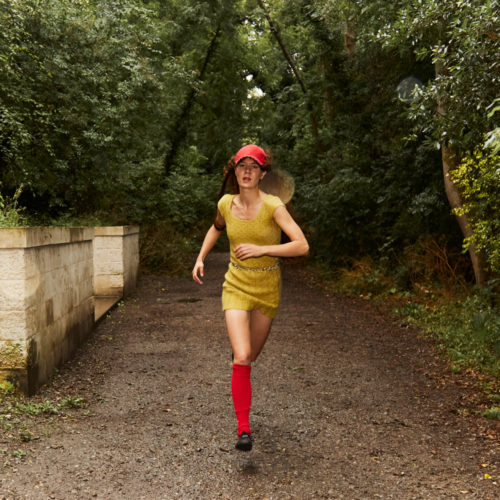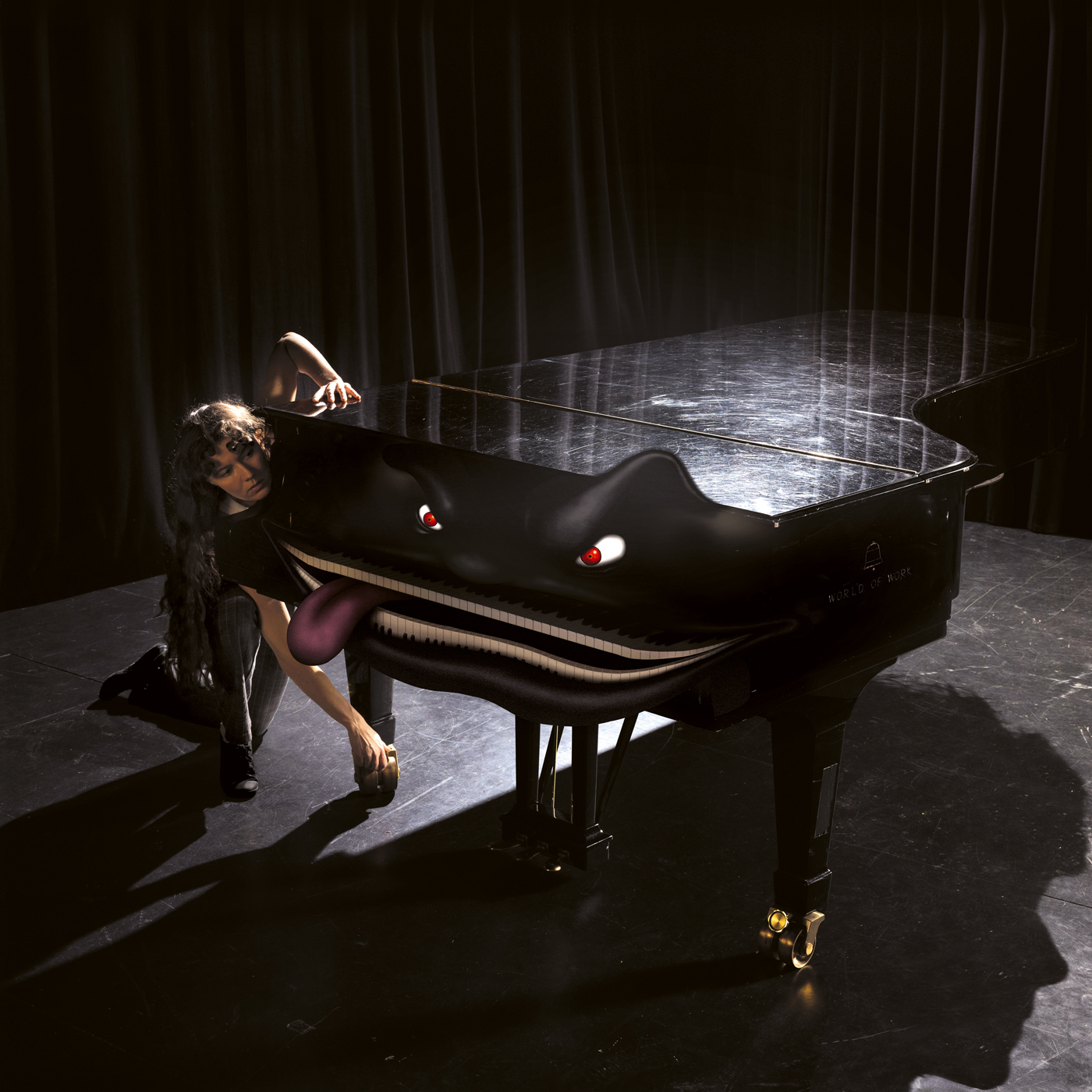
World Of Work
—
Out April 12, 2024
—
Warp Records



WORLD OF WORK: Toward A Greater Beauty
by Matt Marble
Upon first hearing the music of Clarissa Connelly, I was immediately drawn into its otherworldly beauty. A genre-devouring producer and multi-instrumentalist, Clarissa is also a studied composer and skilled arranger. Her music is a dream-like synthesis of Nordic folk song, mediaeval chant, and modern pop music, as well as experimental composition and studio practices. Transmuting styles, both ancient and modern, her songs take flight in a wonderfully mythic imagination. And on World of Work they soar.
Born in Fife, Scotland, as a child Clarissa relocated to Copenhagen, Denmark, whose cultural landscape has continued to fuel her creativity. Over many years she’s explored the sacred sites, mythology, and music of Nordic culture, finding enduring inspiration in the Celtic tradition. While she’s maintained an active role in the thriving local music scene, a global audience has awakened to her sound. She first gained international attention with Tech Duinn (2018), an hypnotic EP named after a spiritual gateway in Celtic myth. For her most recent album, The Voyager (2021), Clarissa physically walked the Scandinavian landscape, channelling melodies from ancient pre-Christian sites. She also developed an app (Vandringen) which allowed others to virtually join-in and musically respond to these sites. The album received global acclaim and was awarded the prestigious Nordic Music Prize. Both more intimate and cosmic in scope than its predecessors, World of Work draws inspiration from visionary literature, dreams, and meditative walks. While The Voyager explored the sacred history of the Nordic landscape, World of Work explores the metaphysical landscape of the soul. The listener is invited on an inner journey that is by turns hushed and ecstatic, thoroughly mesmerising.
If World of Work sounds enchanted, it’s no accident. The best melodies come to Clarissa when meditatively walking alone in a half-conscious state. While mapping out the interior landscape of this album, she developed a practice of liminal listening. “There are different layers to consciousness,” she describes. “And there’s a way to practise that I’ve found and started working on with this album: the practice of listening to layers of melody that are right underneath the layer of speech.” Understanding the spiritual and creative importance of liminal experience and its formative influence in childhood, Clarissa notes “I’ve spent most of my life trying to recreate these very deep and magical experiences I’ve had as a child with music.” Thisactive re-enchantment of the world is central to her art. And that essential practice is powerfully presented as both the content and form of this work. Like an ancient prayer manual or mediaeval grimoire, this album illuminates a secret map through symbol and song. Hieroglyphic sounds and clairaudient melodies mark the terrain, as we are drawn deeper into the metaphysical heart of World of Work.
The album’s title was inspired by the writings of 20th century French philosopher George Bataille, whose book, Erotism, explores the role of ecstasy and visionary experience in modern society. “Man has come to know the exterior world [of work],” he writes, “but he remains ignorant of his own nature. [Yet] if he had not first awoken to awareness through work, he would know nothing at all.” Clarissa equates this “world of work” with experiences of alienation and trauma by which we may easily succumb to the brute forces of the world rather than seek inner empowerment of another order—a loss in the family notably informed the making of this album. And although World of Work establishes us in an apparently dystopian image, it actively seeks to revitalise it from within.
Hildegard von Bingen, another visionary author who influenced this album, speaks to this regenerative power of music in a letter she wrote in the 12th century. There she describes music as a tool to recapture the vital essence and beauty of our heavenly origin, which we lose sight of when falling prey to worldly woe. By nurturing our spiritual desire through music, Hildegard claimed the human voice could “blend fully with the voices of the angels in their praise of God.”And it’s precisely through such liminal listening practices—via dreams, meditation, prayer, divination, trance/automatism, etc—that the language of spirit become symbolically accessible. In one of the most beautifully haunting tracks on the album, “Life of the Forbidden,” Clarissa presents the following dream-inspired exchange with an angel-like figure:
“Oh, can you see there’s more in the world of work?
No, it’s barren, it’s shallow
Nothing can compare with the love above,
It’s holy, incomparable.”
This is one of the many moments in the album where the will for otherworldly beauty asserts itself. Though World of Work begins in disorientation as Clarissa mantrically declares, “I don’t know how I got here, but I know loneliness is here,” the music immediately provides a technology of self-calming. The second track features solely the tolling of bells—recorded at various Danish churches—which paradoxically symbolise both warning and celebration. Songs of separation and new beginnings (“I called you to say I’m leaving home”) resound with those of questioning mortality (“What if death is a false alarm?”) and religion (“Are we led to believe a lie?”). Rather than providing any decisive answers, Clarissa says of her queries, “I stand open towards them.” The worldly and the otherworldly then appear as abstract and interconnected characters interrogating one another throughout the album. “I still ask these questions,” she says, “I think I’m going to ask [them] for the rest of my life.”
Clarissa’s keyboard playing (piano, korg M1), guitar work, and singing are featured throughout—she also plays the bells. Working her way through music school and immersed in the Danish music community, she collaborated with a group of local friends and musicians as well as several musical guests to hone the unique soundscape of World of Work. Playing throughout the album are drummer Mikkel Trøjborg Fink, bassist Johan Polder, and guitarist Andreas Murga Ramon. A chorus of voices provides ethereal support to Clarissa’s blossoming vocal on “Wee Rosebud.” While several other guitarists were brought in to create the gloriously crafted cacophonies at the end of “Embroidery” and “Song of the Sword S.O.S.” The flute playing of Joalane Mohapeloa on the latter song lends it to serene flotation before it’s anthemic obliteration closes out the album. “That song had to end the album,” Clarissa notes, “because that’s the great Apocalypse.”
Some of the magic on this album arrives in unexpectedly hushed moments, like the enigmatically whispered chant at the end of “The Excess of Sorrow, Laughs.” Or the choral weaving that closes “Life of the Forbidden” (“…strangely does the water in the river flow…”).Throughout, the beauty of the music transcends the worldly burdens it unpacks, while Clarissa’s sense of humor easefully inserts itself. The opening song begins with her parody of the world’s monstrous nature, delivered in a low and playfully gravelled voice (“Silence… World of Work…”)—the monstrous remains scary until you can laugh at it. We also meet this playfulness on the album cover art and in the video for the album’s second single, “Embroidery,” both of which feature a keyboard with a hyperactive, creepy cartoon mouth. Truly a dynamic offering, the album is filled with diverse moods and styles of expression. But there is a tender power—grounded and dreamy, intelligent and empathic, childlike and wise—that runs through it all. The composition, songwriting, arrangements, performances, lyrics, and production make the album sparkle with infectious wonder.
Raised in a Catholic home, Clarissa is no stranger to ceremony and prayer. And though she no longer identifies with the Catholic faith, she found inspiration in St. Teresa of Avilla’s Interior Castle while working on this album. Bataille claimed that we are distracted by the world of work and “ignorant of our own nature;” while St. Teresa echoed, “each of us has a soul, but we forget to value it.” It was toward the end of the 16th century that St. Teresa had a mystical vision in which the human soul was portrayed to her as a crystal castle. The centre of Teresa’s Interior Castle is inhabited by divine love. Six other dwellings surround the central chamber of this metaphysical architecture. And by reflecting on each of these dwellings one is tested by a host of worldly fears and desires. But the central chamber admits only an otherworldly love. “The door by which we enter this castle,” Teresa proclaims, “is prayer.” And through her contemplative method of prayer, Teresa guides one to their divine identity in the central chamber. Looking at the overall form of World of Work, it loosely reflects St. Teresa’s manner of prayer.
You’ll find a rosebud at the centre of this album. The songs surrounding this young rose carry images of bereavement and existential query. Yet amid all forces of chaos, this rose proudly blossoms in the sunlight with childlike abandon. Presented in a reimagined 16th century musical style, the little rose gleefully sings, “Try to see my petals… The sun’s warmth folds me out. I’ll take my time folding out. Look at me, I’m a wee rosebud.” Like St. Teresa’s interior castle, this album calls us to confront the spectres of fear and death that surround us. At the same time, it guides our attention to a flowering vitality both within ourselves and the world at large. The song “Wee Rosebud”—the album’s first single—serves as a symbolic anchor for the album and its regenerative power as a whole.
While the album begins in confusion, it ends by projecting spiritual inquiry upon apocalyptic speculation (“what will I believe when the sky turns?”). “What would it actually look like if the world was ending,” Clarissa reflects, “if I could be a part of that?” Her music and lyrics continually point to a life force which challenges the oppressiveness of the world with a beauty beyond understanding. And, in many ways, this is how Clarissa spiritually identifies. “I definitely believe in a greater beauty,” she says, “I’m not sure what that greater beauty is. But I can experience it through music. I want to create something that speaks to a greater beauty that I believe is in the world.” And that is what she has achieved with World of Work, a celebration of the greater beauty pervading this life even in its toughest forms. While you’ll find yourself returning to the songs on this album for months and years to come, I hope they also lead you, if only momentarily, to the wee rosebud within yourself.